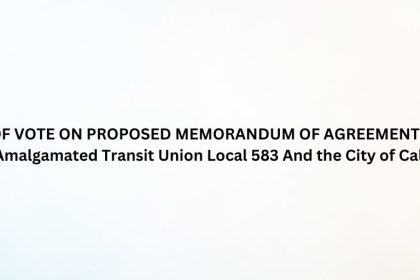Solidarity is the foundation of Union strength. At its core, it means that when we stand together, united in the pursuit of better wages, safer working conditions, and fair treatment we have power. The power of solidarity has driven significant change in Canada, from the establishment of basic labour rights to the creation of programs like public healthcare. In Canadian Unions, solidarity isn’t just a concept, it’s the force that fuels collective action and enables us to achieve meaningful gains.
In a Union, solidarity means mutual support and cooperation among workers, regardless of our individual roles, positions, or backgrounds. It’s the idea that an injury to one is an injury to all, and that when one worker’s rights are violated, it affects the entire collective. Solidarity in Unions is not just about supporting each other in good times; it’s about sticking together in difficult situations, like during labour disputes, strikes, or difficult bargaining sessions.
Unions are built on the belief that workers are stronger when we act as one. It’s a principle that has allowed workers in Canada to negotiate for improved working conditions, better wages, and benefits that many people now take for granted. Without solidarity, Unions would be far less effective, as employers could more easily divide and conquer a workforce by isolating individual workers or groups.
Canada has a rich history of worker solidarity. From the early labour movements in the 19th century to the widespread establishment of Unions across various industries, solidarity has been a driving force in securing workers’ rights in this country.
Take the Winnipeg General Strike for example, one of the most significant moments of labour solidarity in Canadian history. When thousands of workers in Winnipeg went on strike, they were fighting for better wages, working conditions, and the right to organize. The strike, which involved workers from many sectors, highlighted the power of collective action and solidarity. The workers were united in their struggle. In the short term, the strike ended in arrests, bloodshed and defeat, but in the long run it contributed to the development of a stronger labour movement and the tradition of social democratic politics in Canada.
Today, Canadian Unions are deeply involved in advocating for workers’ rights, not just through collective bargaining, but also by engaging in political action committees, social justice initiatives, and public education.
For example, when workers in one sector face unsafe working conditions or unfair bargaining practices, other Unions will rally behind them in solidarity. This is happening right here, right now, in our own back yard, as the Alberta Federation of Labour leads the fight for fair collective bargaining across all sectors of the Province through The Common Front. On a smaller but equally important scale we saw this with essential workers during the COVID-19 pandemic, when workers in healthcare, retail, and transportation stood together to demand better protection, hazard pay, and access to sick leave. The pandemic revealed just how crucial solidarity remains today for workers in precarious jobs, and highlights how Unions and our Members’ having solidarity with other workers can come together to shift management ideals for non-Unionized workers.
Solidarity also shines through in efforts to address broader social issues. Canadian unions have long advocated for policies like universal healthcare, paid sick days, and stronger public services, all of which benefit workers across the board. Unionized or not.
There is no truer example of “a rising tide lifts all boats” (J.F Kennedy) than what organized labour has done collectively that would be all but impossible to accomplish individually.
Whether we are fighting for better wages, safer working conditions, or broader social change, our collective power is what makes meaningful change possible. Solidarity reminds us that no worker should be left behind.










